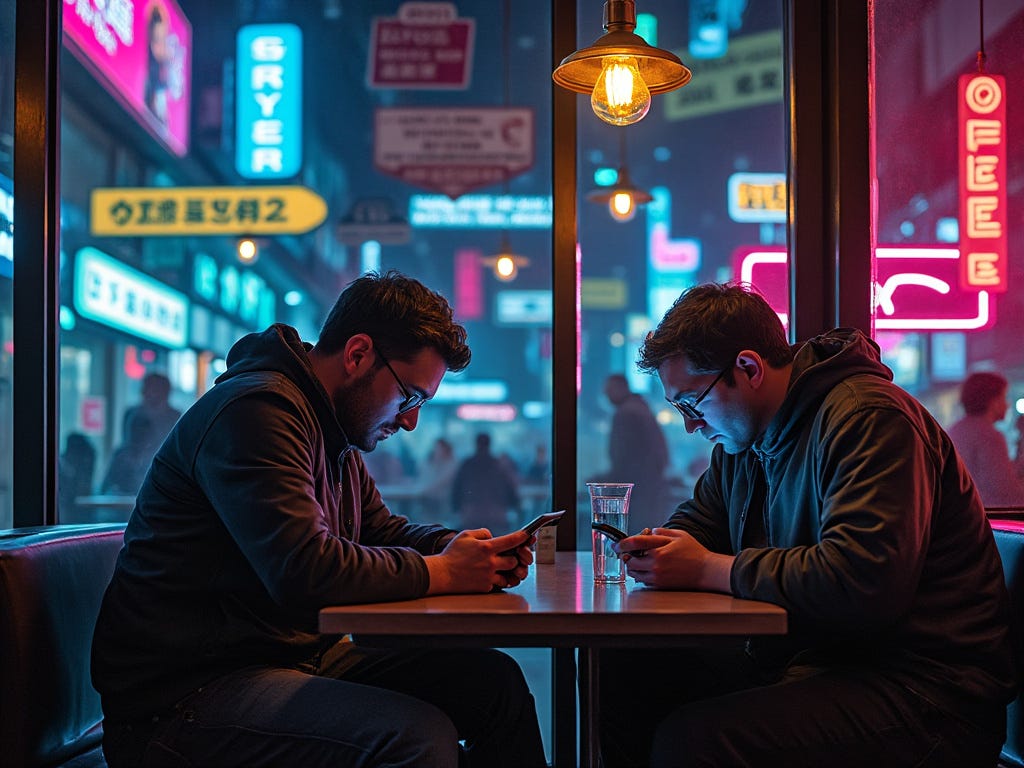TikTok and Instagram are intellectual poison
These apps are refined sugars and seed oils for the mind, causing a comparable type of mental sickness as those have on the body
"Irony is the song of a bird that has come to love its cage." —David Foster Wallace
Many things in modernity are brain dead, but I can’t think of anything worse than the short form dystopias of TikTok and Instagram. They’re materially making people dumber, breeding addict behavior (particularly in the young) and ultimately ruining the lives of normies. It’s depressing to think about the countless kids who might have started garage bands or tinkered building electronics who instead grow up scrolling endlessly. The social internet wasn’t this way in the world we grew up in when desktop-based, it was a place of connection, of intellectual curiosity and niche-interest destinations to connect and grow. The Substack community is closer to this and Twitter/X is still this way for those willing to do a little work (always has been).
But these two apps in particular are insidiously poisoning many minds. It’s so bad I really think all you need to do is not use them, particularly on mobile, and you’ll immediately possess a level of attention/focus (and likely values) higher than a non-trivial percentage of the population. Free alpha to simply delete. If the challenge of contemporary existence is learning how to wield attention meaningfully, then TikTok and Instagram are weapons-grade distractions, optimized by some of the smartest people given incredible monetary incentives (generational wealth in many cases) to control the human mind. They’re emblematic of how this attention can be commodified, manipulated and ultimately, destroyed.
At the core of these platforms is the algorithm: an omniscient system that not only tracks user behavior but also shapes it. TikTok and Instagram do not merely respond to what users like, they anticipate it, providing a relentless stream of dopamine hits and condition someone to behave like a drug addict. Each swipe, each tap, is a lever in a kind of digital Skinner box, training users to crave more and more fragmented bursts of stimulation. Is someone trained to constantly reach for their cell phone any different than a mouse in such an experiment?

Over time, these micro-rewards reinforce patterns of engagement, conditioning users to prefer the brief, the fast and the immediate. In doing so, they rewire the brain’s pathways to expect constant, low-effort bursts of pleasure. TikTok’s infinite scroll and Instagram’s endless cascade of glossy/filtered images offer an instant gratification that demands almost nothing in return, except the costliest currency of all: our attention, and with that, our life.

This attention, once hijacked, is no longer yours to deploy as you choose. In fact, the ability to sustain focus on anything outside the brief, rapid-fire bursts provided by these platforms begins to wither: users are trained to consume information, ideas, and emotions in bite-sized portions, stripped of context or depth. The art of sustained thought, reflection, and even conversation is gradually eroded by the expectation everything should come packaged in a 30-second clip or a perfect square image. The result is a widespread diminishment of attention, a kind of cognitive impairment that undermines the capacity for deep engagement whether with art, relationships, or even our own internal lives. In short, it’s a ceding of agency.

Moreover, these platforms exacerbate one of the most toxic aspects of modern existence, particularly for women: comparison. Instagram serves as a virtual hall of mirrors, each image reflecting not reality but an aspirational, curated, and often entirely fabricated version of life. Every flawless body, every perfectly filtered vacation, every effortless success becomes a data point against which users compare their own messy, unfiltered lives. They sadly forget their realness, their imperfections are the most beautiful things possible. This culture of perpetual comparison fosters a sense of inadequacy that is corrosive to self-worth, breeding insecurity and discontent. The lives users are invited to envy are, in a profound sense, not even real, yet they measure their own worth against these digital illusions, leading to a pervasive sense of dissatisfaction and self-loathing. I hadn’t updated Instagram in years but recently deleted the account altogether as there’s nothing redeeming for me there. My life is significantly better by taking such actions, and FOMO is for children and causes nothing but pain (particularly the financial variety, which these apps also breed).
Platforms like TikTok and Instagram are engines of distraction and cultural rot. They stand in front of the more difficult but more rewarding aspects of life: deep work, intimate connections with friends and loved ones, focused attention for hobbies with intrinsic rewards. By training users to crave constant novelty and the immediate approval of anonymous audiences, these platforms slowly destroy our humanity one scroll at a time.
Freeing yourself could be the beginning of a new adventure for some of you to rediscover the depth and richness of sustained, meaningful attention you are able to direct and start to live an active existence. Otherwise, you risk being trapped as a spectator in your own life, scrolling endlessly through a feed that leads nowhere. It’s a prison you voluntarily lock yourself in, slowly poisoning your soul. Ask yourself, why are you afraid to leave?



